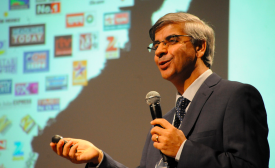soft power

Having recently returned from the International Studies Association (ISA) conference in Toronto, I wanted to share some thoughts with the PD community, and particularly the scholars who for some reason or other couldn’t attend. For those who aren’t familiar, ISA is the major annual conference where PD scholars convene, particularly through the International Communication (ICOMM) and Diplomatic Studies divisions. ISA has around 5,000 participants, of which the regular faces working on PD comprise of less than one percent.
As one of the most bankable stars on the planet, Johnny Depp has the luxury of keeping his PR obligations brief. But he was jumping through press hoops this week as he made his first trip to China to sell moviegoers on his new sci-fi film, "Transcendence," which opens here April 18.
From the wild popularity of such shows as “24” with super-agent Jack Bauer out to save the world, to the popular sequels of the end-of-the-world “Transformers” movie, American television series and movies have always played well in China.
Halfway through an otherwise coherent conversation with a Georgian lawyer last week—the topics included judges, the court system, the police—I was startled by a comment he made about his country’s former government, led by ex-president Mikheil Saakashvili. “They were LGBT,” he said, conspiratorially.

Frameworks for cultural diplomacy in the U.S. are often too narrow and too broad.
Frameworks for cultural diplomacy in the U.S. are often too narrow and too broad. On the one hand, self-identified practitioners of cultural diplomacy – within and outside government – tend to identify, if somewhat generically, specific exportable forms of expressive culture (think: music, theater, literature, dance, murals, or film).
First lady, Michelle Obama is currently visiting China with her daughters, Sasha and Malia and her mother, Marian Robinson. The trip marks the first ever made by a first lady to China without her husband in tow. Mrs. Obama is there to promote educational exchanges between the U.S. and China but she has also subtly been addressing the issue of freedom of expression.







